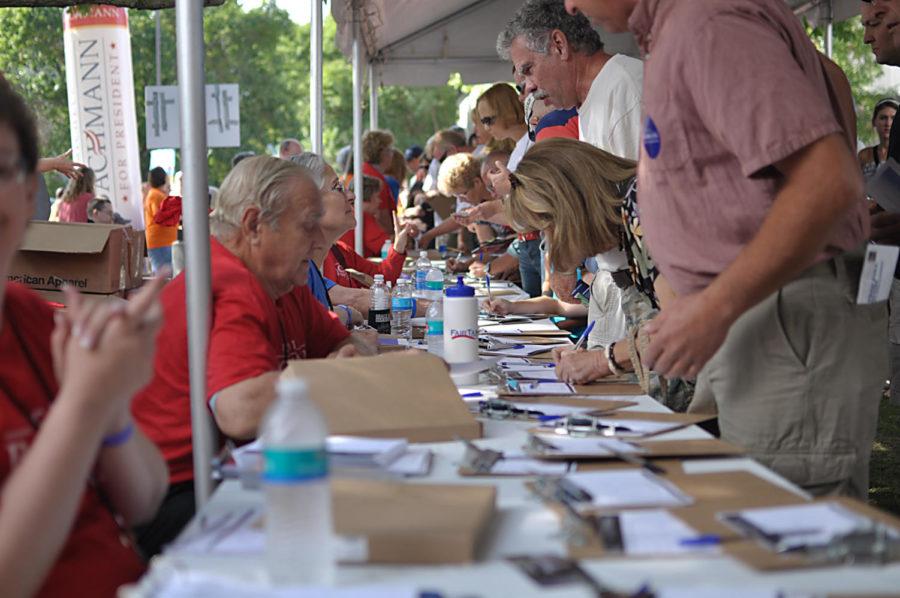Guest column: Instead of scrapping Straw Poll and caucuses, make them better
Photo: Karuna Ang/Iowa State Daily
Bachmann supporters register to vote during the 2011 Ames Straw Poll on Aug. 13 at the Iowa State Center.
December 3, 2012
As you know, every four years in August there is an event in Ames where the Iowa Republican Party hosts a candidate festival that ends in a “Straw Poll,” which is a popularity contest to see who can get the most people to support them as the GOP candidate for president.
The poll is not a scientific measure of a candidate’s popularity, but it’s a fun event, raises money for the Iowa GOP and does test potential GOP candidate’s organizational skills.
This year, the poll has come under attack from several sources, including David Yepsen, former chief political reporter for The Des Moines Register, who has been invited to Ames by the Harkin Institute for Public Policy for a panel on the Iowa caucuses and presidential selection. I’m sorry to disagree with my friend and colleague.
The buzz is that in 2011, the Straw Poll was malevolent because former Minnesota Gov. Tim Pawlenty’s third-place finish ended his campaign. Anyone who thinks that if Pawlenty had won the Straw Poll, he could have beaten Mitt Romney or Rick Santorum in the Iowa caucuses, won primaries in the South and gotten the GOP nomination, is delusional.
Those who argue the Straw Poll “prolongs the campaign” by starting the presidential candidacy chase too early have overlooked an important fact. The race for the White House starts about three days after we elect a president. In 2012, it started when Florida Sen. Marco Rubio came to give the keynote at Iowa Gov. Terry Branstad’s birthday party just a few weeks after Romney lost. Louisiana Gov. Bobby Jindal launched his pre-candidacy just days after the election ended by laying out the need for the GOP to reach out to younger voters and immigrants. New Jersey Gov. Chris Christie started running for president when he thanked Obama for disaster aid thereby, distracting the country from Mitt Romney’s bid for the White House and showing that bipartisan cooperation not divisive attack politics is a big hit with voters. Former Florida Gov. Jeb Bush started jockeying for 2016 when he… well, you get the idea.
The Straw Poll is actually not too bad in propelling Republicans forward.
In 1979, George Bush won and went on years later to become U.S. president. In 1987, Bob Dole came in second but four years later won the GOP nomination for president. In 1999, George Bush won the poll, proceeded to get the nomination and became president of the United States. In 2007, Mitt Romney won, and four years later, Romney became the GOP nominee for president. If Romney had participated in 2011 he would no doubt have either won or come in second in the Straw Poll. I say that’s a remarkably good record for the Straw Poll is tagging top GOP contenders for the White House.
As I’ve pointed out in several op ed pieces and interviews, it is very dangerous to talk about how well the Straw Poll picks the GOP nominee and candidate for that year. The reason is reporters then begin to ask, and I have had many ask me since the Straw Poll story broke, how well the Iowa caucuses predict who will be the GOP candidate or who will become president.
The answer is that the caucuses also are not a very good predictor.
In 2012 — Rick Santorum won by a few votes (25 percent), and Mitt Romney came in second (25 percent) followed by Ron Paul (21 percent),
In 2008 — Mike Huckabee won the caucuses (34 percent), followed by Mitt Romney (25 percent) and a tie between Fred Thompson (13 percent) and John McCain (13 percent). McCain went on to get the GOP nomination.
In 1988 — Bob Dole won (37 percent), followed by Pat Robertson (25 percent), George H. W. Bush (19 percent), Jack Kemp (11 percent) and Pete DuPont (7 percent). Neither Dole nor Robertson got the nomination, and it was No. 3 Bush who got the nomination and won the White House.
In 1980 — George H. W. Bush won (32 percent), while Ronald Reagan came in second (30 percent), Howard Baker third (15 percent). Reagan went on to get the GOP nomination and win the White House.
I don’t mind that neither the Straw Poll nor the caucuses are precisely accurate. They are excellent barometers of who Iowan’s think are top GOP contenders for the White House, whether they come in first, second or third in Iowa. These events help candidates test their message and organizational skills, give them visibility, help the party shape it’s national message by testing it in Iowa and right after in New Hampshire.
Both the Straw Poll and the Caucuses are a great start to the national political season. They make for a nice story and have become a national tradition. I say make them work even better.

















